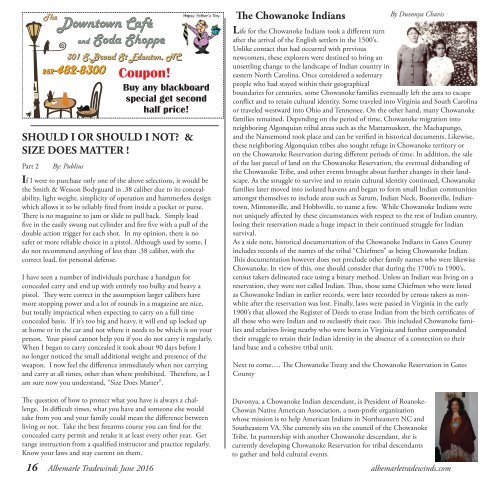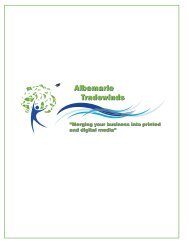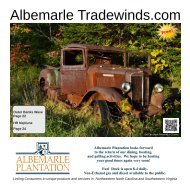Albemarle Tradewinds June 2016 Final Web Optimized
June 2016
June 2016
Create successful ePaper yourself
Turn your PDF publications into a flip-book with our unique Google optimized e-Paper software.
SHOULD I OR SHOULD I NOT? &<br />
SIZE DOES MATTER !<br />
Part 2<br />
<br />
<br />
<br />
<br />
<br />
<br />
By: Publius<br />
<br />
<br />
<br />
If I were to purchase only one of the above selections, it would be<br />
the Smith & Wesson Bodyguard in .38 caliber due to its concealability,<br />
light weight, simplicity of operation and hammerless design<br />
which allows it to be reliably fired from inside a pocket or purse.<br />
There is no magazine to jam or slide to pull back. Simply load<br />
five in the easily swung out cylinder and fire five with a pull of the<br />
double action trigger for each shot. In my opinion, there is no<br />
safer or more reliable choice in a pistol. Although used by some, I<br />
do not recommend anything of less than .38 caliber, with the<br />
correct load, for personal defense.<br />
I have seen a number of individuals purchase a handgun for<br />
concealed carry and end up with entirely too bulky and heavy a<br />
pistol. They were correct in the assumption larger calibers have<br />
more stopping power and a lot of rounds in a magazine are nice,<br />
but totally impractical when expecting to carry on a full time<br />
concealed basis. If it’s too big and heavy, it will end up locked up<br />
at home or in the car and not where it needs to be which is on your<br />
person. Your pistol cannot help you if you do not carry it regularly.<br />
When I began to carry concealed it took about 90 days before I<br />
no longer noticed the small additional weight and presence of the<br />
weapon. I now feel the difference immediately when not carrying<br />
and carry at all times, other than where prohibited. Therefore, as I<br />
am sure now you understand, “Size Does Matter”.<br />
The Chowanoke Indians<br />
By Duvonya Chavis<br />
Life for the Chowanoke Indians took a different turn<br />
after the arrival of the English settlers in the 1500’s.<br />
Unlike contact that had occurred with previous<br />
newcomers, these explorers were destined to bring an<br />
unsettling change to the landscape of Indian country in<br />
eastern North Carolina. Once considered a sedentary<br />
people who had stayed within their geographical<br />
boundaries for centuries, some Chowanoke families eventually left the area to escape<br />
conflict and to retain cultural identity. Some traveled into Virginia and South Carolina<br />
or traveled westward into Ohio and Tennessee. On the other hand, many Chowanoke<br />
families remained. Depending on the period of time, Chowanoke migration into<br />
neighboring Algonquian tribal areas such as the Mattamuskeet, the Machapungo,<br />
and the Nansemond took place and can be verified in historical documents. Likewise,<br />
these neighboring Algonquian tribes also sought refuge in Chowanoke territory or<br />
on the Chowanoke Reservation during different periods of time. In addition, the sale<br />
of the last parcel of land on the Chowanoke Reservation, the eventual disbanding of<br />
the Chowanoke Tribe, and other events brought about further changes in their landscape.<br />
As the struggle to survive and to retain cultural identity continued, Chowanoke<br />
families later moved into isolated havens and began to form small Indian communities<br />
amongst themselves to include areas such as Sarum, Indian Neck, Booneville, Indiantown,<br />
Mintonsville, and Hobbsville, to name a few. While Chowanoke Indians were<br />
not uniquely affected by these circumstances with respect to the rest of Indian country,<br />
losing their reservation made a huge impact in their continued struggle for Indian<br />
survival.<br />
As a side note, historical documentation of the Chowanoke Indians in Gates County<br />
includes records of the names of the tribal “Chiefmen” as being Chowanoke Indian.<br />
This documentation however does not preclude other family names who were likewise<br />
Chowanoke. In view of this, one should consider that during the 1700’s to 1900’s,<br />
census takers delineated race using a binary method. Unless an Indian was living on a<br />
reservation, they were not called Indian. Thus, those same Chiefmen who were listed<br />
as Chowanoke Indian in earlier records, were later recorded by census takers as nonwhite<br />
after the reservation was lost. <strong>Final</strong>ly, laws were passed in Virginia in the early<br />
1900’s that allowed the Register of Deeds to erase Indian from the birth certificates of<br />
all those who were Indian and to reclassify their race. This included Chowanoke families<br />
and relatives living nearby who were born in Virginia and further compounded<br />
their struggle to retain their Indian identity in the absence of a connection to their<br />
land base and a cohesive tribal unit.<br />
Next to come…. The Chowanoke Treaty and the Chowanoke Reservation in Gates<br />
County<br />
The question of how to protect what you have is always a challenge.<br />
In difficult times, what you have and someone else would<br />
take from you and your family could mean the difference between<br />
living or not. Take the best firearms course you can find for the<br />
concealed carry permit and retake it at least every other year. Get<br />
range instruction from a qualified instructor and practice regularly.<br />
Know your laws and stay current on them.<br />
Duvonya, a Chowanoke Indian descendant, is President of Roanoke-<br />
Chowan Native American Association, a non-profit organization<br />
whose mission is to help American Indians in Northeastern NC and<br />
Southeastern VA. She currently sits on the council of the Chowanoke<br />
Tribe. In partnership with another Chowanoke descendant, she is<br />
currently developing Chowanoke Reservation for tribal descendants<br />
to gather and hold cultural events.<br />
16 <strong>Albemarle</strong> <strong>Tradewinds</strong> <strong>June</strong> <strong>2016</strong> albemarletradewinds.com

















